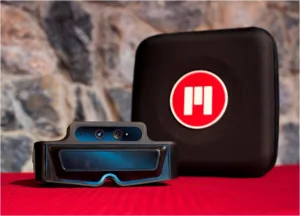We have reported before on Meta Augmented Reality as a developer of augmented reality glasses. The California-based company was founded in 2012 and has raised $2 million in its Kickstarter campaign, selling 1,500 AR glasses in the process. Of those developer kits, 500 have been shipped so far. While early prototypes were produced on 3D printers, they have since moved to sourced parts from around the world, with the final assembly taking place in San Jose, California.
The headset features a binocular design with see through glasses and double cameras. When it was first announced it was seen as a competitor to Google Glass, leading to its success in the crowd funding campaign.
Source: Meta Augmented Reality
The latest financing round was looking for less money initially, but investor demand let to an increased scope, leaving the company with ample cash. The money will be used to hire more hardware and software engineers to drive the development at a faster pace, but also to nurture the relationship with developers to create applications for the Meta AR headset. Another goal for the company is to create roadshows, hackathons and developer workshops.
Similar to the Google Glass development, general public use is not the main target at the moment. The initial Meta developers have included enterprise applications including showrooms, warehouses and first responders going through emergency simulations in their application developments. In general, most augmented reality makers are focusing more on enterprise uses than consumer gaming and communication.
The Meta website still offers the developer kit for sale at a price of $667, with an expected delivery date of August 2015. The money raised in this financing round is not going towards setting up manufacturing, but towards advancing the performance and usability of the headset. It seems safe to assume that we will see more prototype stages before Meta is released as a final product. It will also be interesting to see how the Microsoft HoloLens product will influence the direction of augmented reality overall. – Norbert Hildebrand

